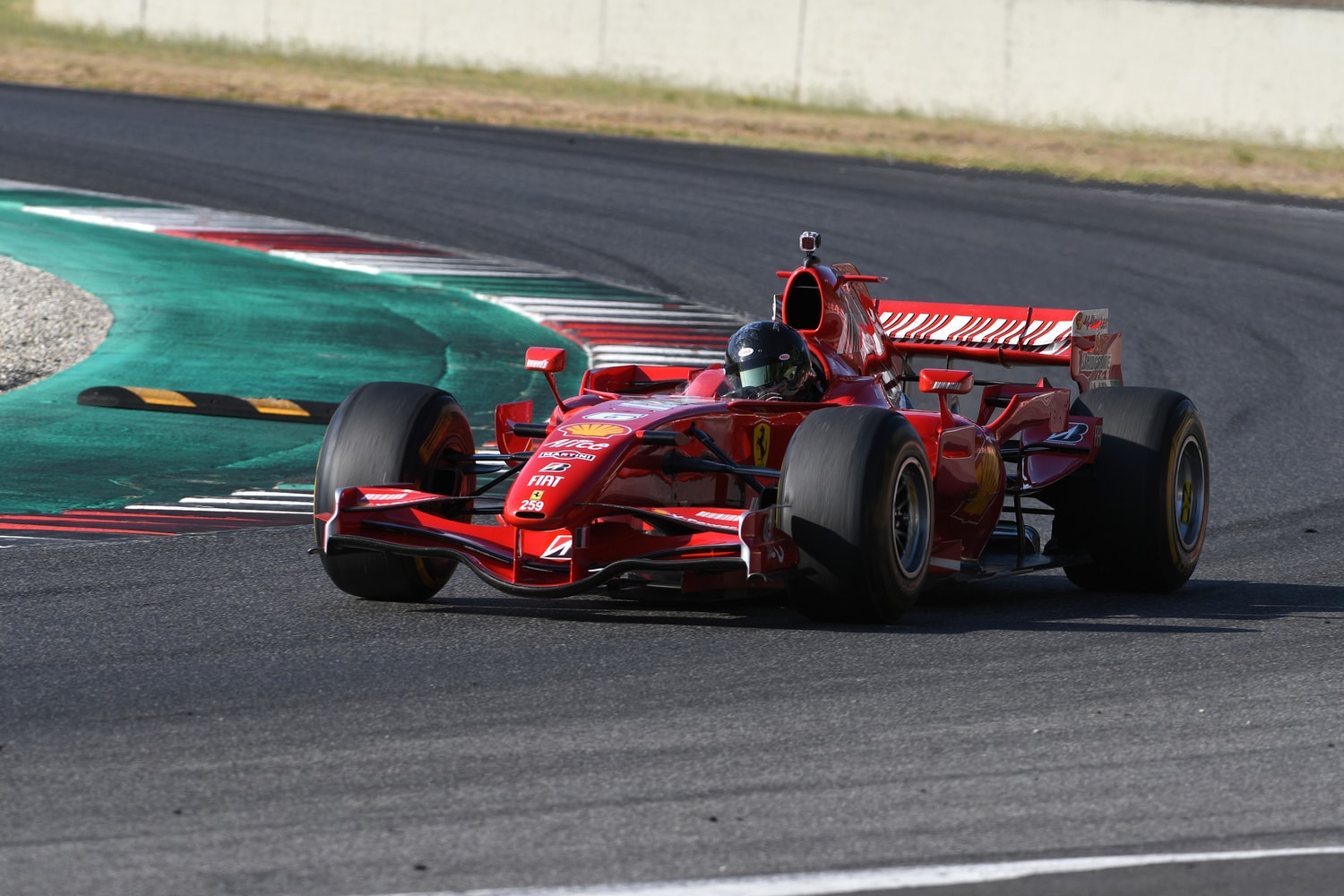Cars have captivated the camera since the earliest days of both photography and automobiles. It’s no wonder that so many people are looking for the best lens for car photography.
Picking the best lens is all about combining what motor heads love most: performance and precision. These lenses are purpose-built for specific scenarios and feature the best of the best when it comes to the science of engineering a camera lens.
Introducing the 7 Best Lenses for Canon EOS M6 Mark II
- Canon EF 50mm f/1.2L USM Lens: The Best Canon Lens for Car Photography
- NIKKOR Z 70-200mm f/2.8 VR S Lens: Best Nikon Lens For Car Photography
- Sony FE 24-105mm f/4 G OSS Lens: Best Sony Lens For Car Photography
- Sony FE 24-70mm f/2.8 GM Lens: Best Sony E Mount Lens For Car Photography
- Leica Noctilux-M 50mm f/0.95 ASPH Lens: Best Lens For Taking Pictures of Moving Cars
- Canon EF 35mm f/1.4L II USM Lens: Best Lens For Car Street Photography
- Canon EF 300mm f/2.8L IS II USM Lens: Best Lens For NASCAR and F1 Fans!
Start your engines car lovers, we’re covering the 7 best lenses for car photography.
1. Canon EF 50mm f/1.2L USM Lens: The Best Canon Lens for Car Photography
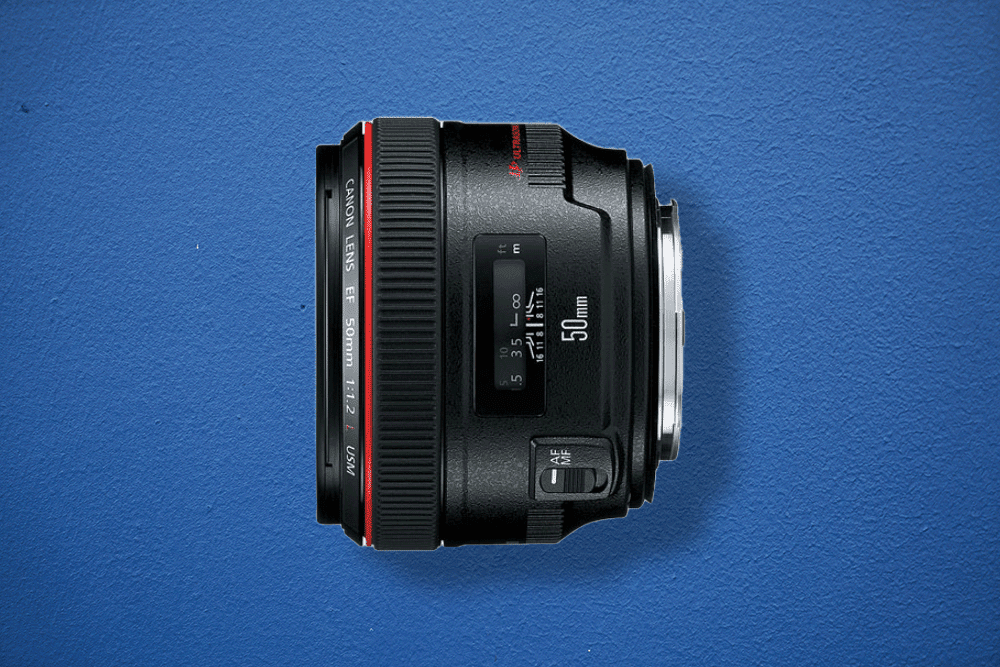
Specs
- Focal Length: 50 mm
- Size: 85.8 x 65.5 mm
- Weight: 580 g
- Compatibility: Full Frame
- Image Stabilization: No
- Aperture: f/1.2
- Autofocus: Yes
Best For Car Photography And Best In General
What can we say about this lens other than it’s nearly perfect? The 50 mm lenses from Canon are ideal for nearly any photography job which includes car photography. These lenses are ideal if you’re on the street snapping pics of passing cars, or you’re looking to get a press pass for the next F1 or NASCAR race.
It all comes down to versatility. This is a lens that does it all, and it does it very well. The 50 mm focal length easily works in different shooting conditions and that f/1.2 aperture will make even that fastest cars look like they’re standing still.
With all this said, this is part of Canon’s L series which is their pro-tier line of lenses. You could get similar stats at a tenth of the price with Canon’s budget version.
Pros
- This is the professional model of the Nifty 50 which is one of the most popular lenses of all time
- The f/1.2 aperture will freeze action in place given you crystal clear shots
- 50 mm is flexible enough for almost every photography style
Cons
- 50 mm won’t cut it if you’re hoping to take zoomed in shots from your seats in the stands
- There are more affordable alternatives that deliver similar results
2. NIKKOR Z 70-200mm f/2.8 VR S Lens: Best Nikon Lens For Car Photography
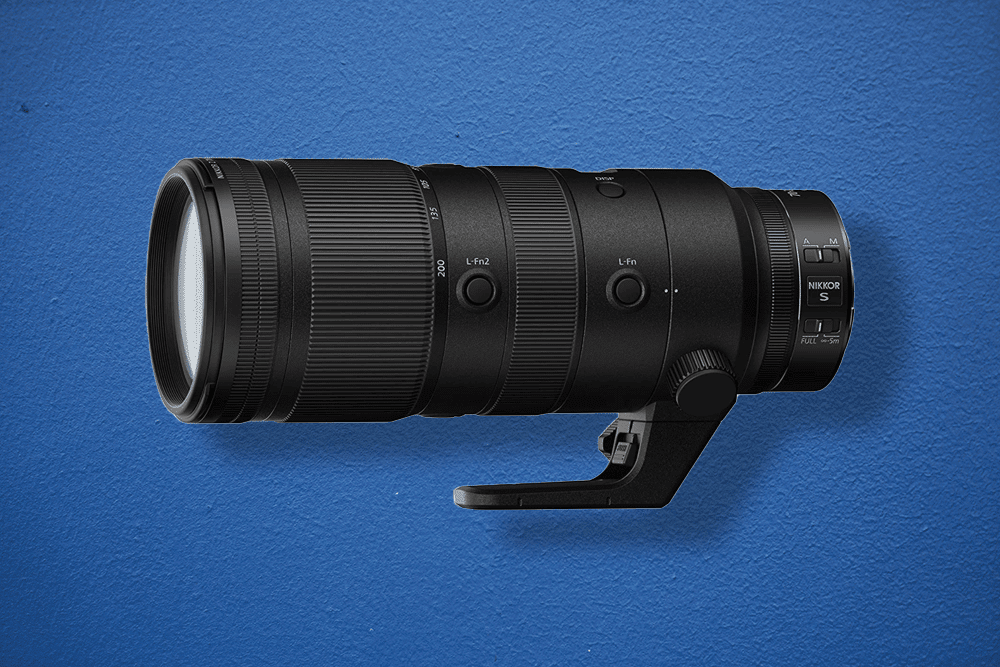
Specs
- Focal Length: 70 to 200 mm
- Size: 89 x 220 mm
- Weight: 1360 g
- Compatibility: Full frame
- Image Stabilization: Yes
- Aperture: f/2.8
- Autofocus: Yes
Nikon Lets You Capture Cars Up Close And At Distance
The best thing about a good zoom lens is that it gives you the freedom to get up close or take pictures from a leisurely distance. The NIKKOR Z 70-200mm f/2.8 VR S Lens is an ideal choice for Nikon cameras whether you’re in the middle of the action or watching from your seats.
This lens is one of Nikon’s finest. The weather sealing, solid build quality, and sleek design are going to feel at home in the hands of car buffs and photographers alike. This is also the kind of lens that you can get some serious work out of.
Pros
- 70 mm to 200 mm is good enough to capture car pics whether you’re up close or watching a race
- The f/2.8 aperture can easily handle most speeding cars—especially when considering the added image stabilization
- This camera is weather sealed, so you don’t have to worry about getting caught in the rain
Cons
- This is a heavy lens that could leave you feeling encumbered after a long day of photography
- The price point for this lens could be out of range for some photographers
- The focal length minimum of 70 mm means that taking pics in cramped quarters, like a showroom, could cause some problems
3. Sony FE 24-105mm f/4 G OSS Lens: Best Sony Lens For Car Photography
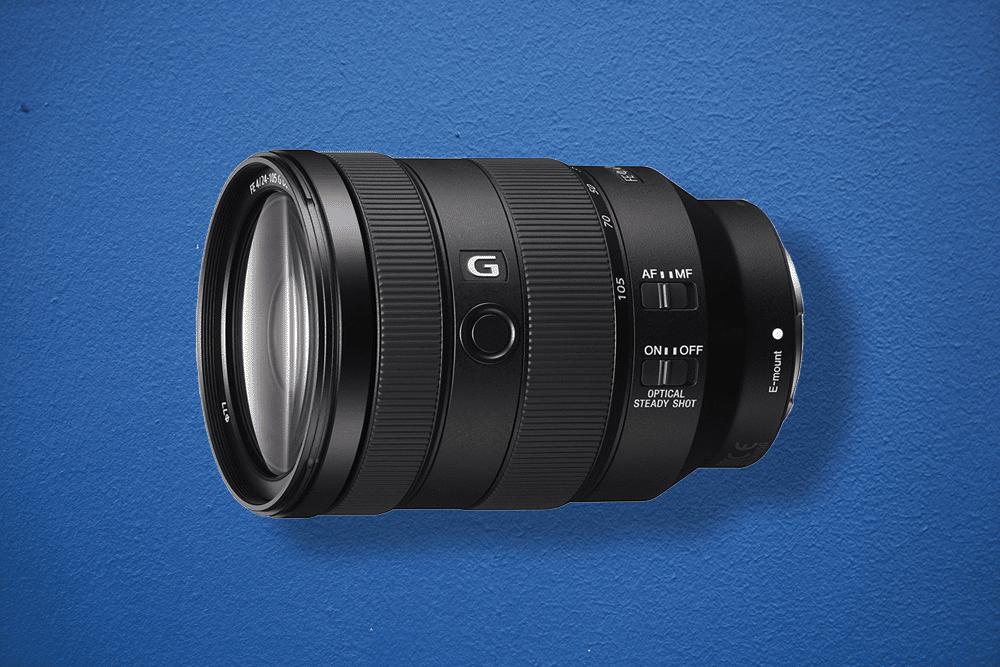
Specs
- Focal Length: 24 to 105 mm
- Size: 83.4 x 113.3 mm
- Weight: 663 g
- Compatibility: Full frame
- Image Stabilization: Yes
- Aperture: f/4
- Autofocus: Yes
A Balanced Approach To Auto Photography Lenses
This lens weaves a delicate balance between a powerful tool for vehicle photographers and something that might need a little more work back on the drafting table. This lens has you covered if you’re looking to explore your style, and you’re rocking one of Sony’s new cameras.
However, that f4 aperture is something worth talking about. That aperture will struggle to “freeze” the action in place when capturing moving cars, but that might not be a bad thing. Part of the fun of watching fast cars is the blur when they zoom by. The f/4 aperture will capture that blur and help you share the excitement of being on the racetrack.
Pros
- This is an incredibly impressive focal length range that allows you to capture everything from cramped showroom floors to telephoto shots
- This lens has a middle-tier price point which will be more accessible to most buyers
- The f/4 aperture will force photographers to grow their skills to capture fast-paced shots
Cons
- F/4 is going to be a deal-breaker for people who are looking to catch fast cars in motion
- The added range past 70 mm might make you just want to get a 70 to 200 mm lens instead
4. Sony FE 24-70mm f/2.8 GM Lens: Best Sony E Mount Lens For Car Photography
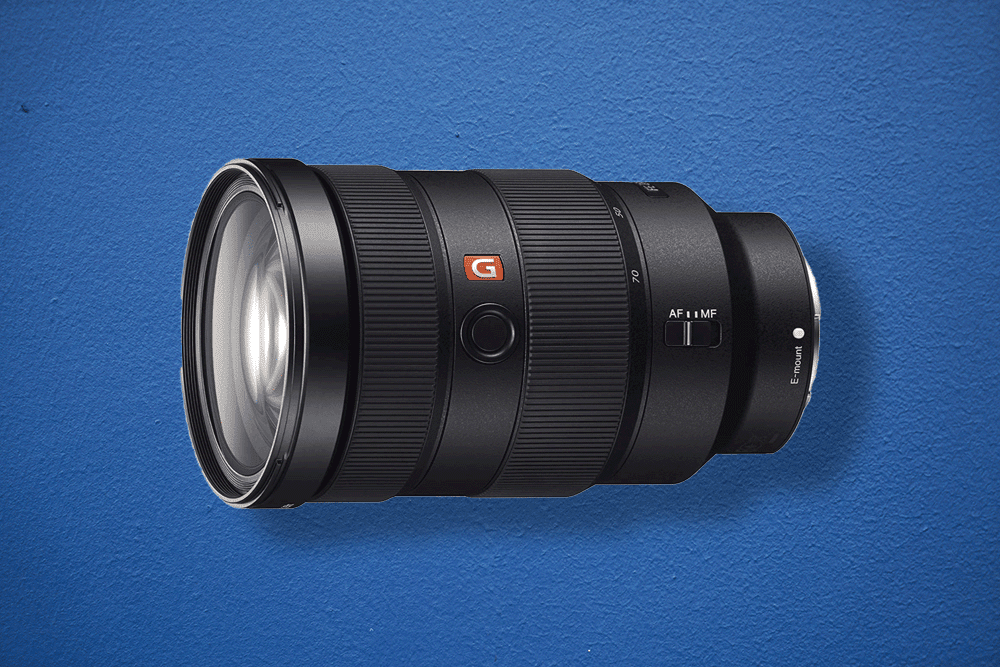
Specs
- Focal Length: 24 to 70 mm
- Size: 87.6 x 136 mm
- Weight: 886 g
- Compatibility: Full frame
- Image Stabilization: No
- Aperture: f/2.8
- Autofocus: Yes
Objects In The Mirror
Mirrorless cameras are coming to dominate the photographic world. They tend to have higher resolutions, more focus points, and they represent the latest advancements in camera technology. It’s great to see companies like Sony putting out more lenses for these new models.
This lens is no slouch when it comes time to check out the local car show. You’ve got a wide enough option to get artistic with wide angle shots and the 70 mm zoom can help you snap some shots of cars at a distance.
Really, this is a well-rounded package for completing your mirrorless camera upgrade. Sony’s stylish design fits in well whether you’re scoping some classic American muscle cars or you’re off to see some performance European racing.
Pros
- Sony’s GM line of lenses is their professional tier of products for their mirrorless cameras
- This range of focal lengths gives you plenty of options for your car photography style
- The weight of this lens is offset by the lightweight nature of mirrorless cameras
Cons
- If you’re not into the mirrorless camera game, you’re going to want one of the other options on this list
- The 24 mm bottom end of the focal length is a little wide for most car photography projects
5. Leica Noctilux-M 50mm f/0.95 ASPH. Lens: Best Lens For Taking Pictures of Moving Cars
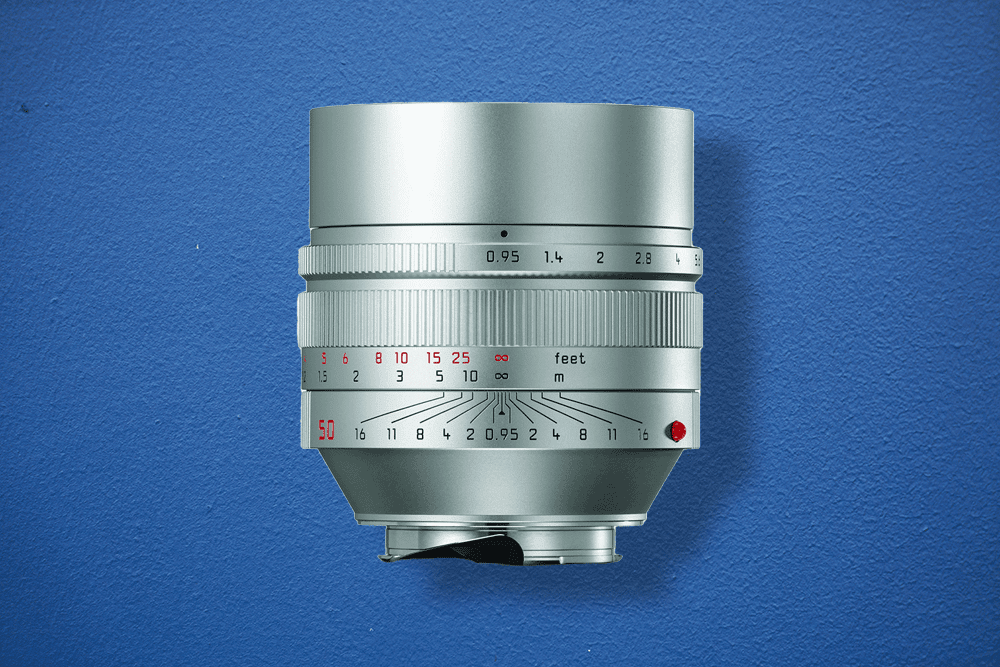
Specs
- Focal Length: 50 mm
- Size: 83.4 x 113.3 mm
- Weight: 663 g
- Compatibility: Leica M
- Image Stabilization: Yes
- Aperture: f/0.95
- Autofocus: Yes
Freeze All Motion In Place
Yes, you read that right. That’s no typo. This lens has an aperture of f/0.95. That’s fast enough to freeze all motion in place and capture details like you’ve never seen them before.
Noctilux lenses are a premier product that demand a high price. These are the cream of the crop when it comes to photography lenses and there’s not much else above them in the world of photography.
The only downside, besides a price so high you might need to take out a loan, is that these lenses use the Leica M Mount. You’ll either need an adaptor or a Leica camera to make good use out of this lens. However, once you shoot with something that has f/0.95, you’ll never go back.
Pros
- This lens will freeze motion in place unlike anything you’ve ever shot with before
- Leica has a reputation for making products that border on flawlessness
- That perfect aperture is paired with a very friendly and versatile focal length
Cons
- The price of this lens is almost definitely more than the cost of your camera
- The Leica M Mount means you’ll need an adaptor to shoot with Canon, Sony, or Nikon camera
6. Canon EF 35mm f/1.4L II USM Lens: Best Lens For Car Street Photography
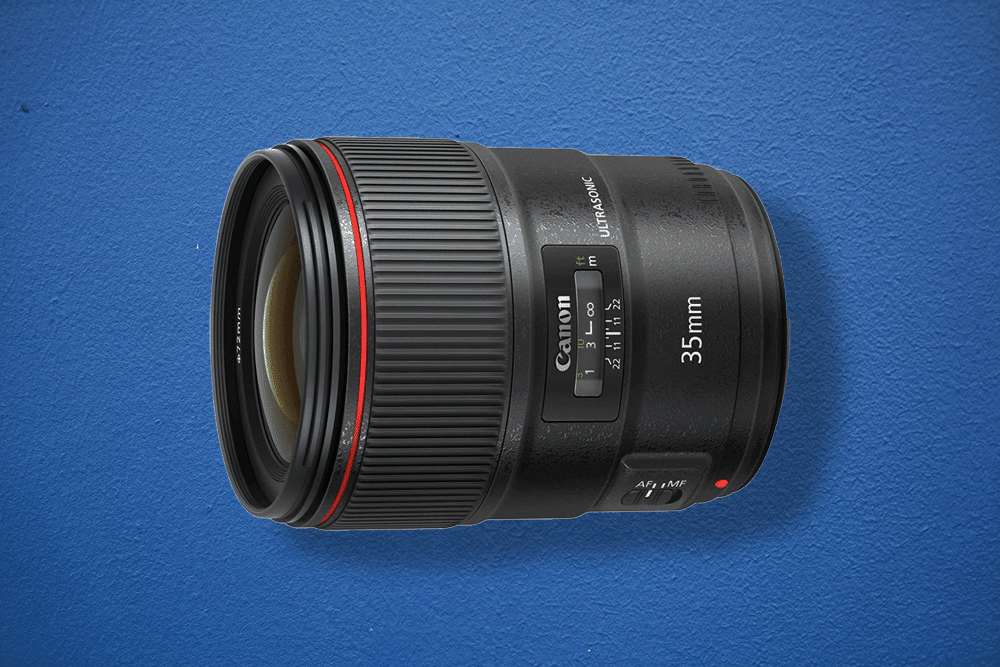
Specs
- Focal Length: 35 mm
- Size: 80.4 x 105.5 mm
- Weight: 760 g
- Compatibility: Full frame (FE)
- Image Stabilization: No
- Aperture: f/1.4
- Autofocus: Yes
Embrace The History Of Car Show And City Streets
Street photography is a great way to catch up on what’s going on in the local car scene. You’ll spot unexpected classics, high-performance models, and all kinds of custom jobs while you’re out and about. This 35 mm lens helps you capture those rare sightings without standing out.
Way back in the days when film photography ruled, 35 mm was king. Today, this focal length doesn’t get the attention it deserves. You can consider this the classic car of the world of lenses.
Why not take this vintage focal length out of a test drive?
Pros
- 35 mm is an ideal length for having a powerful lens that handles street photography with ease. It’s discrete and it still gets the job done
- This lens lets you cover car shows, showrooms, and even gives you an option for taking pictures while walking around your home city
Cons
- A 35 mm focal length means that you are going to be doing all of your zooming with your feet
- At 35 mm, the type of distortion that you get in your shots will require some fixing during the editing process
7. Canon EF 300mm f/2.8L IS II USM Lens: Best Lens For NASCAR and F1 Fans!
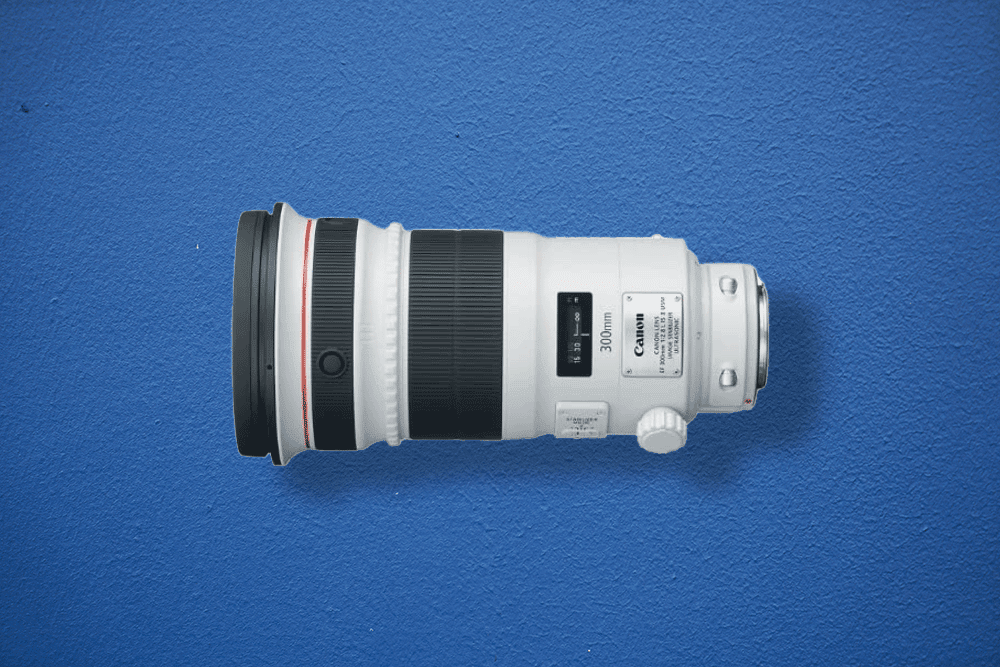
Specs
- Focal Length: 300 mm
- Size: 128 x 248 mm
- Weight: 2.4 kg
- Compatibility: Full frame (FE)
- Image Stabilization: yes
- Aperture: f/2.8
- Autofocus: Yes
Cover The Race Track From Any Distance
If you want to really capture sports as fast as F1 and NASCAR, you need a lens that covers the distance and offers a lightning-fast aperture. This prime 300 mm lens does both.
You’ll be able to get up close and personal with the fastest cars out there, but still keep a respectful distance from the action. This lens is capable of freezing the action in place but still gives a little visual motion.
This is a large piece of kit, and it signals a step-up from the amateur scene to the world of professional photography.
Pros
- This lens combines the quality of prime lenses with an unbeatable telephoto range
- This is quite literally the lens that pros use when they cover fast-paced sports like F1 and NASCAR
- This is the kind of lens that shouts “I’m a professional, and I’m here to work!”
Cons
- There’s no way around this point: this lens weighs a ton!
- This is a heavy investment for seasoned professionals or very dedicated amateurs
- Some racetracks, arenas, and other venues might not let you in with this level of tech unless you’re a professional
How To Pick Best Lens For Auto Photography
Need a little help picking the best lens for car photography? Our buying guide will walk you through three of the biggest questions people have when it comes to picking a lens.
How to choose the right lens for car photography
If you’ve been asking yourself “what lens to use for car photography,” you’re not alone. Cars, racing sports, and other motor-drive pastimes have been a part of global culture for generations. Picking the right lens can make or break your experience.
You want to pick a lens that does three things.
First, it should fit your budget. No use in buying a lens that drains your finances because that means you won’t be able to afford hitting all those races and car shows!
The second thing to consider is focal length. Are you a street photographer who gets up close and personal or will you be selecting your shots from the press ranks at the next big race? Pick a focal length you can work with or go for a zoom lens to get more options.
The last thing to consider is aperture. Cars move fast, and you’ll need an equally fast aperture to keep up with the action.
What focal length is good for car photography
The best focal for car photography is the one that matches your style.
Shorter focal lengths, like 35 mm and 50 mm, are ideal for situations where you can get close to the action. These are great for street photography, car shows, and other settings where you’re walking in and around stationary vehicles.
Telephoto focal lengths are perfect for races. If you can’t get too close, but you want your pictures to be right next to the rides, then why not get a lens that zooms you in?
What aperture is best for car photography
The best lens for auto photography is often defined by its aperture. This is the spec that determines how much light gets into your lens. The lower the aperture, the faster the lens is.
This means that low aperture numbers, like f/1.8, are great for capturing cars that are in motion. Larger apertures are better suited to still photography or slower situations.
Conclusion – Which Lens Is Best For Car Photography
Picking the right lens can define your car photography experience.
If you want the all-around best, go with the Canon EF 50mm f/1.2L USM Lens. It offers a little something for everyone and is a welcome addition to any photography kit. Otherwise, the Canon EF 300mm f/2.8L IS II USM Lens is perfect for when you want professional quality at a distance while the Sony FE 24-70mm f/2.8 GM Lens gives you versatile options for the new wave of mirrorless cameras.
No matter which lens you pick, these Seven car photography lenses are sure to get your creative engines going!

